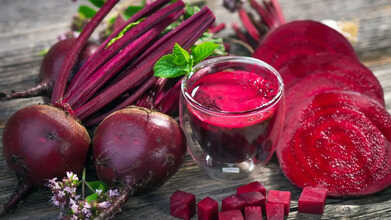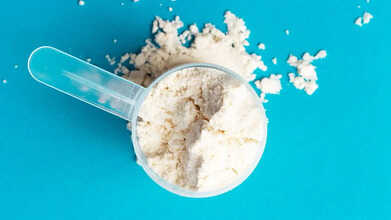- Health Conditions A-Z
- Health & Wellness
- Nutrition
- Fitness
- Health News
- Ayurveda
- Videos
- Medicine A-Z
- Parenting
- Web Stories
You Consume A Pound Of Insects Every Year—List Of Foods That Secretly Contain Bugs

Credit: Canva
The thought of eating insects could even make non-vegetarians squirm, let alone vegetarians. But there a plenty of everyday food items that secretly contain insects. Discussion on the issue began after a report recently revealed that cockroaches were being added to chocolate bars. However, the claim was very quickly debunked.
However, a similar report published in Scientific American claimed that a person consumes an average of one to two pounds of flies, maggots, and other bugs each year without even knowing it. Every day, food items like peanut butter, frozen vegetables and spices like cinnamon can contain a certain amount of bugs.
What Should You Know About Insects In Your Food
Peanut ButterThe peanut butter jar in your pantry can legally contain up to 136 insect parts, according to the FDA’s Food Defect Action Levels guide. From the field to your grocery store, insect fragments often make their way into food production.
Chocolate
The FDA permits up to 74 insect fragments in a 4.4-ounce chocolate bar. Cockroach parts are among the most common contaminants, adding nearly 6,000 bug pieces annually to a chocolate lover’s diet.
Pasta
One gram of pasta can contain a bug fragment, with up to 225 insect parts allowed in a 225-gram portion. These fragments usually come from wheat, which itself may hold up to 75 parts per 50 grams.
Coffee Beans
Your coffee may contain around 120 insect parts per cup. The FDA approves coffee with less than 10 per cent insect infestation, translating to nearly 140,000 bug fragments consumed annually.
Raisins
A single cup of raisins might have up to 35 fruit fly eggs and ten insects. The FDA ensures such small amounts are safe to consume, as eliminating all defects would make food production costly.
Mushrooms
Canned mushrooms with up to 19 maggots and 74 mites are considered FDA-approved. While unappealing, these fragments are often too small to notice and provide protein comparable to chicken or salmon.
Frozen Broccoli
Frozen broccoli can include up to 60 aphids per 100 grams. Regular consumption might lead to unintentionally eating over 1,600 aphids a year, as these tiny bugs commonly infest crop fields.
Canned Tomatoes
A 14.5-ounce can of tomatoes can legally contain eight fly eggs or one maggot. Interestingly, insect eggs are a delicacy in some cultures, like Mexican caviar, made from aquatic insect eggs.
Fruit Juice
The FDA allows canned fruit juices to have one maggot per 250 millilitres. Despite this, insects are a natural part of food processing, so your morning OJ likely contains a harmless amount.
Ground Pepper
Ground pepper can legally hold up to 475 bug fragments per 50 grams. Those insect heads and legs may be adding more spice to your meals than you realise.
Cinnamon
Up to 400 insect fragments are allowed per 50 grams of cinnamon. While this may not deter you from using the spice, it’s worth noting that your favourite desserts might not be entirely vegetarian.
Sauerkraut
Sauerkraut can contain up to 50 thrips, small stick-like insects. Knowing this might make you reconsider your next serving of this condiment.
Berries
Raspberries and blueberries can legally include up to four larvae or ten insects per 500 grams. These critters often end up unnoticed in canned or frozen berries.
Think Your Milk Is Fresh? Simple Ways To Spot Adulteration At Home

Credits: Canva
Milk is one of the most common items found in every household and is considered a wholesome food packed with calcium, protein, and vitamin D.
It plays an important role in maintaining strong bones, building muscles, and supporting overall health. Because of its nutritional richness, milk is often called a complete food. However, it is essential to ensure that the milk you consume is pure and free from adulteration. Contaminated or diluted milk can lose its nutritional value and even harm your health. Fortunately, there are simple methods you can try at home to find out whether your milk is pure or adulterated.
What Is Milk Adulteration?
Food adulteration is the intentional act of reducing the quality of food by mixing or replacing it with inferior substances, or by removing essential components. The same applies to milk. While contamination of food can happen accidentally during storage, transport, or distribution, adulteration is done deliberately for profit.
Milk adulteration involves adding materials such as water, urea, detergent, or other chemicals to increase volume or extend shelf life. This practice reduces the nutritional value and can pose serious health risks to consumers.
How To Check Milk Adulteration at Home
There are a few simple ways to check for adulteration using common items at home:
- Water Test: Pour a small amount of milk onto a slanted surface. Pure milk flows slowly, leaving a white trail, while milk mixed with water flows quickly and leaves little or no mark.
- Detergent Test: Shake equal parts of milk and water. Pure milk forms a light foam, whereas adulterated milk creates thick, soapy froth.
- Starch Test: Add a few drops of iodine solution to the milk. If it turns blue, starch has been added.
- Urea Test: Mix a small amount of milk with soybean powder and dip red litmus paper into it. If the paper turns blue, it indicates the presence of urea.
What Happens When You Consume Adulterated Milk
Regularly drinking adulterated milk can cause several health issues from short-term stomach discomfort to severe, long-term illnesses. The exact effects depend on what substance has been added, ranging from diluted water to harmful chemicals.
Immediate Health Effects
- Digestive problems: Contaminants like urea, detergent, or unclean water can cause nausea, vomiting, diarrhea, and stomach cramps.
- Irritation and burning: Strong alkaline substances such as caustic soda may burn the mouth, throat, and digestive tract, damaging body tissues.
- Allergic reactions: Some chemical additives and impurities can trigger allergies, leading to rashes, itching, or breathing difficulty.
Long-Term Health Consequences
- Kidney damage: Chemicals like urea overwork the kidneys, increasing the risk of long-term damage or kidney failure.
- Liver problems: Preservatives such as formalin (formaldehyde) used to prolong milk’s freshness can harm the liver over time.
- Cancer risk: Long exposure to toxic compounds, including formalin and certain pesticides, has been linked to cancer.
- Heart disease: Artificial fats or vegetable oils added to milk can raise bad cholesterol, contributing to heart problems.
- Hormonal imbalance: Cattle injected with hormones like oxytocin can pass traces into milk, disrupting natural hormone levels in humans.
- Weakened immunity: Consuming impure milk regularly can weaken the immune system, making you more prone to infections.
- Nutritional deficiency: When milk is diluted or its nutrients are replaced with cheaper additives, it loses its health benefits. This is especially harmful for children, as it can affect their growth and development.
THIS Common Vegetable Juice Can Help Lower Your Blood Pressure Naturally

Credits: Canva
A common vegetable has been found to help reduce blood pressure in older adults, according to a new study. Beetroot juice can lower blood pressure in people aged 60 and above by targeting certain potentially harmful bacteria in the mouth. Researchers at the University of Exeter studied how younger and older adults responded to beetroot juice, which is rich in dietary nitrates. These nitrates are converted by the body into nitric oxide, a compound that relaxes and widens blood vessels, helping to lower blood pressure.
How the Study Tested Beetroot Juice on Younger and Older Adults
The study included 39 adults under the age of 30 and 36 adults in their 60s and 70s. For two weeks, each group received shots of beetroot juice. After a two-week break, during which participants used antiseptic mouthwash daily, they were given a placebo juice without nitrates for another two weeks.
Researchers analyzed the bacteria in participants’ mouths using gene sequencing. In both groups, the oral microbiome—the community of microorganisms in the mouth—changed after drinking nitrate-rich juice, though the effects were different depending on age. In older adults, there was a reduction in common bacteria that can sometimes cause infections and an increase in bacteria that support health. The older participants also showed lower blood pressure after two weeks of drinking the nitrate-rich juice.
Professor Andy Jones of the University of Exeter said, “This study shows that nitrate-rich foods can change the oral microbiome in ways that may reduce inflammation and lower blood pressure in older adults. This opens the door for larger studies to examine how lifestyle factors and biological sex affect responses to dietary nitrate supplements.”
Can A Person Drink Beet Juice While Taking Blood Pressure Medication?
It may be possible to drink beet juice while taking blood pressure medications. However, it’s important to consult a doctor before making any changes to a treatment plan for high blood pressure.
A doctor can advise whether combining beet juice with blood pressure medication could lower blood pressure too much. If this happens, a person may experience symptoms such as:
- Dizziness or lightheadedness
- Blurry vision
- Fainting
- Confusion
- Weakness or tiredness
- Headache
- Back or neck pain
- Heart palpitations
- Nausea
Low blood pressure (hypotension) can be serious. If someone experiences severe symptoms that do not improve when sitting or lying down, they should seek immediate medical attention.
Does Eating Beets Lower Blood Pressure?
Eating beets may help reduce blood pressure, but most research has focused on beet juice rather than whole beets.
Currently, there isn’t enough scientific evidence to confirm that eating beets has the same effect as drinking beet juice.
If someone wants to explore dietary changes to manage their blood pressure, it’s best to consult a doctor before making adjustments.
As Unsafe Levels of Lead Are Found in Protein Powders, Here Are Safer Alternatives You Can Switch To

Credits: Canva
Protein powder lead consumer reports: Some protein powders and shakes have been found to contain unsafe amounts of lead, according to a recent Consumer Reports investigation. The report, released Tuesday, analyzed 23 protein products, including dairy, beef, and plant-based supplements and revealed that over two-thirds contained more lead per serving than what experts consider safe, which is around 0.5 micrograms a day.
With growing concern over heavy metal contamination in protein powders, it’s worth exploring healthier, safer alternatives to meet your protein needs.
Protein Powders, Shakes Contain High Levels of Lead and Other Metals, Consumer Reports Finds
“Protein powders and shakes have become incredibly popular among people looking to add more protein to their diet,” said Brian Ronholm, director of food policy at Consumer Reports, in a news release. “Our tests found that toxic heavy metal contamination in protein supplements is widespread and has worsened since we first examined these products 15 years ago.”
According to the findings, plant-based protein powders had the highest levels of lead, averaging about nine times more than dairy-based options like whey and twice as much as beef-based products.
Among the products tested, Naked Nutrition’s Vegan Mass Gainer and Huel’s Black Edition were identified as containing the highest levels of lead and were listed under “products to avoid.” The full list of tested brands is available in the report.
Protein Powder Lead Consumer Reports: Alternatives To Protein Powder And Health Supplements
Andrew Mock, MD, MPH, a preventive and lifestyle medicine specialist at Loma Linda University Health and also California’s Strongest Man says the flood of protein products in the fitness market can often lead people to spend large sums on items that may not be beneficial, necessary, or even safe.
“For a non-active adult, about 0.8 grams of protein per kilogram of body weight is enough to prevent deficiency,” Mock explains. “For those who exercise regularly, the target should be 1.2 to 1.6 grams per kilogram daily. Higher amounts can be safe, but most people don’t actually need that much.”
Although protein shakes are convenient, nearly half of Americans (46%) drink them regularly Mock notes that they are not essential.
“You can easily meet your protein needs with regular food,” he says. “Protein powders and ready-to-drink shakes are helpful for busy days, but they shouldn’t be treated as dietary must-haves.”
Whole food protein sources include:
- Eggs
- Fish such as salmon, tuna, and cod
- Greek yogurt
- Cottage cheese
- Milk
- Beans like black, kidney, and lentils
- Chickpeas
- Tofu
- Quinoa
- Chia seeds
- Flaxseeds
- Nut butters such as peanut, almond, or cashew
When time allows, homemade protein shakes made with natural ingredients are another safe and nutritious choice.
What Safe Supplements Should You Take?
While supplement companies are required to register with the U.S. Food and Drug Administration (FDA), the agency doesn’t routinely test their products. This lack of regular oversight raises safety issues, including contamination.
“It’s surprisingly common for even well-known supplement brands to contain harmful ingredients,” Mock warns. “These can include heavy metals, anabolic steroids, or other banned substances. One study even found that one in eight supplements contained illicit materials.”
Contamination has been detected across various products, from protein powders and multivitamins to herbal capsules with some not even containing what their labels promise.
To reduce these risks, Mock advises checking packaging for third-party testing certifications, which confirm that a product meets strict safety standards.
“Look for labels such as the National Science Foundation (NSF) mark, or certifications like Informed for Sport and Certified for Sport,” he says. “Another key label is current Good Manufacturing Practice (cGMP), which means the supplement is produced under proper safety and hygiene conditions monitored by the FDA.”
These certifications offer a level of reassurance that a supplement has been independently tested and verified. By checking for them, consumers can make smarter and safer choices when buying protein powders or other health products.
© 2024 Bennett, Coleman & Company Limited

